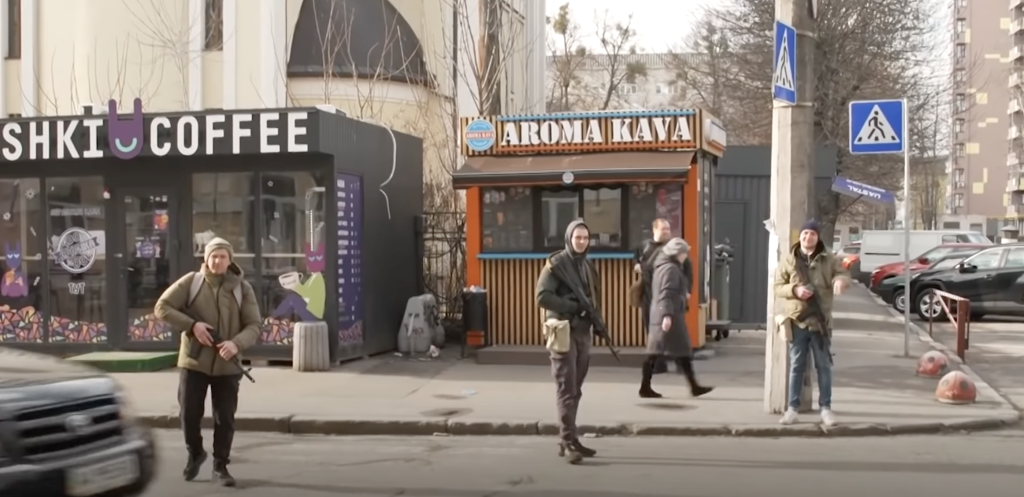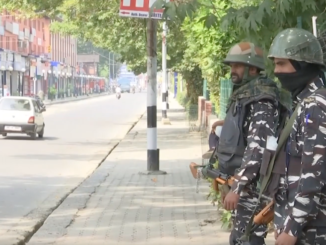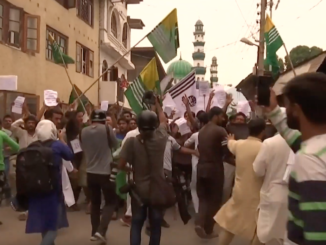
The Russian intervention in Ukraine has served as a swift reminder of the uncompromising and unchanging nature of power politics. The relatively recent absence of major power conflict had created a deliberate sense of complacency, the collective choice to believe that interdependent economies and the risks associated with a misadventure, were reason enough to preclude the possibility of a clash between titans again. This misguided optimism has been proven starkly wrong. Moreover, the manner in which the conflict is unfolding as Ukraine fights to defend itself is a naked reminder that no country can rely on any other for securing its sovereignty.
As much as anything else, the current crisis is also a war of representation.
Putin’s televised address to ‘Citizens of Russia and friends’, immediately following the violation of Ukrainian sovereign territory, was aimed as much as the international audience as it was at his own people. It was an explanation of the decision he had taken, the steps that had led up to it, and the actions of the international community that had justified it. He spoke of the West’s “contemptuous and disdainful attitude to our [Russian] interests and absolutely legitimate demands”, and challenged what he termed the former’s insolent disregard for Russian concerns. He attributed these attitudes to the moment the former Soviet Union faltered and collapsed, creating an imbalance of force in the global community, forcing Russia into a perpetually disadvantageous position, and holding it hostage thereafter to a double standard for major powers.
Perhaps the strongest statements he makes are not the thinly veiled threats, that those who attempt to interfere will face consequences “such as you have never seen in your entire history”. Rather, he reserves his greatest emphasis for the assertion that Russia was left with no other choice but to act the way it has in Ukraine, for the sole objective of self-preservation. Referencing Russia’s pushback against forces in the Caucasus in the early 2000s and the takeover of Crimea in 2014, he points to the current incursion into Donbass as measure for self-defense – a circumstance in which Russia “could not act otherwise” – and not an infringement upon Ukraine or the disregard of its people’s wishes.
The repeated justification makes sense when weighed against not only the international outrage and the measured response of countries Russia has close ties with, but also when considering the protests by Russians who are adamantly opposed to their leader’s decision. Presenting this fait accompli as necessary to safeguard the Russian way of life and Russia itself might well be the only way to reach across to a domestic audience that has been open in its criticism of Putin and his hold on power, as well as to ameliorate the image of a dictator flagrantly disregarding international law.
Perhaps no other leader’s optics stand as in contrast to Putin’s as do those of Ukrainian President Zelenskyy. Having arisen to this challenge to his nation with the response one demands of a war-time leader, he has taken the imagination of the international community by storm, effortlessly outshining his US and European counterparts. Pictures of Zelenskyy in battle fatigues on the front lines, and videos taken on the streets of Kiev as he tells the world that Ukrainians are not running away from this fight, continue adding to the image of David fighting against the big, bad Russian Goliath.
Far more interesting are the images of him standing behind the podium as he makes an official statement dressed in plain clothes. The casual garb serves a purpose. For one, it signals that in this time of crisis, the Ukrainian leadership gives no quarter to unnecessary formalities or protocol; this is a time to rally to the trenches. For another, it feeds the international community’s imagination, reminding the world that Ukraine is the underdog, the scrappy insurgency that could, fending for itself as it stares down the invader marching towards it, abandoned by a toothless international community of powers.
The impact is undeniable. Zelenskyy has been hailed as the man of the hour, the man who “truly deserves the tentative comparison to Churchill”, the sole person leading the charge to fill the void of global leadership. Heady stuff for a politician very few saw as a statesman before the region boiled over.
From one perspective, the image that has suffered is that of the Western led international community. The general sense has been of a Ukraine left to its own devices and supported not by boots on the ground but by statements and by sanctions with questionable effect. Biden’s US in particular, having trumpeted for weeks that an invasion was imminent, appears subdued by contrast. Calls for sanctions, declarations of pushing back against the ruthless and hailing the (imagined) reversion to trans-Atlantic unity, is far less attractive than the battle of wills and might being fought in Eastern Europe. Possibly the only headlines the US is making that grab more attention are the efforts to secure Russian energy supplies while they punish Putin. In the world of rapid fire communication and political posturing, Washington has been out-shouted.
China, despite efforts to portray it as a Russian enabler, retains the image of a responsible global power. While adhering to their stated position of respecting territorial integrity and non-interference in other states’ affairs, Beijing has neither condemned Russian action nor supported it with vocal statements. They have, however, been calling out what they believe is hypocrisy in statements from the American leadership about respecting international norms, fighting for a just cause, and protecting the vulnerable.
With negotiations now underway between representatives of Russia and Ukraine, the world watches with bated breath, as do the people of the two nations at war. It will be worth monitoring the responses of the international community to the outcome and pay attention to how the conflict narratives are shaped.
![]()




Be the first to comment